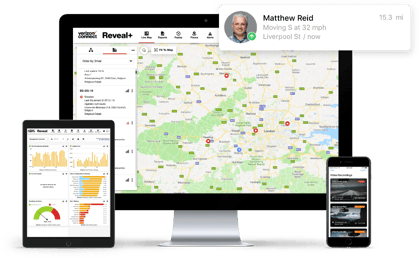How does the construction industry use GPS tracking?
GPS tracking is now an extremely valuable, multi-faceted business tool for the construction industry.
Read more
The construction industry is very important to the global economy. In the United Kingdom alone, this sector employs “more than 2.9 million people in over 280.000 businesses(1) contributing nearly £90bn to the economy.(2)
However, despite the prevalence of this industry in the UK, challenges with digital transformation and going green lie ahead.
With this in mind, decarbonisation is a crucial goal for construction businesses who “should decarbonise more urgently in line with the national emission reduction targets of 68% by 2030 and 78% by 2035” (3) to be on pace to meet the goal of net zero emissions target by 2050.
Findings from a separate study reveal that “the built environment is directly responsible for 25% of the UK’s carbon emissions and therefore has a moral and legal responsibility to rapidly decarbonise”. (4)
So construction company leaders need to focus on reducing emissions, improving productivity, efficiency and sustainability to meet not only the carbon neutrality roadmaps but also to help contribute to the competitiveness of their business through the use of innovative technologies, like asset tracking software.
Let’s dive into what the future of the construction industry looks like:
One of the main challenges for the construction industry is to reduce greenhouse gasses. The good news is, technology can help.
In fact, “digital tools can accelerate the green transition, in the construction sector that can optimise resource efficiency, simulate energy consumption, and optimise life cycle emissions” (5).
In this sense, fleet management technologies like asset tracking can help reduce CO2 emissions and improve key areas of construction businesses.The large number of heavy diesel-engine equipment involved in the construction industry requires monitoring and a detailed overview of equipment and idling times to be able to improve fuel efficiency, utilisation and sustainability.
Further to this, just a small reduction in fuel consumption can make a huge difference as well. According to research, “decreasing one hour idling time of middle-size construction equipment reduces approximately 3.8 litres of fuel consumption and around 6.85 kg CO2 emission production”(6). That in a large construction plant can help save fuel, reduce emissions and help follow a green roadmap to decarbonise the business.
But not only this, the help of fleet management technologies can also have a hugely positive impact. Our latest survey about Fleet Technology Trends Report in Europe 2025 revealed that:
51% of users of asset tracking software in the construction sector improved sustainability and 26% of those surveyed reduced CO2 emissions.
Download the new Advanced Fleet Management for the Construction Industry 2025 and discover how asset tracking technologies help transform the Construction industry.
Trend #2: Reinforcement of team safety at the core of the business
The construction sector is one of the most challenging workplaces in terms of safety, with many teams, machinery, vehicles and tools working in the same area. Unfortunately, the construction industry accounts for the greatest number of fatalities each year.
According to the Health and Safety Executive “the number of injuries in construction in 2023/24 was 51, an increase of 13% from the previous year total (45), though this difference is not statistically significant. (7).
So safety has to be a core pillar for construction companies and raising the bar on safety standards has to be a priority to mitigate the risk of accidents at the workplace - this is where GPS asset tracking software can help.
If you are wondering how, read on:
Download the new Advanced Fleet Management for the Construction Industry 2025 and discover how asset tracking technologies are shaping the future of Construction.
Digitalisation within the construction industry is not an option for businesses that want to keep a competitive position in the market.
Technologies like GPS asset tracking software can help streamline your fleet’s operations, making decisions based on smart data of your assets like monitoring engine hours, seeing what assets are being used, which ones are unproductive and then relocating them in order to help improve productivity. With it you can get more out of every workday and avoid unnecessary equipment rentals.
In this sense, GPS asset tracking software impacts key areas of construction businesses. In fact, the latest survey we ran revealed that 69% of users of asset tracking technology in the construction sector improved equipment and asset utilisation and 52% saw an increase in efficiency/ productivity for drivers/workers.
Download the Advanced Advanced Fleet Management for the Construction Industry 2025 and discover how asset tracking software benefits businesses.
Tags: All




Find out how our platform gives you the visibility you need to get more done.
GPS tracking is now an extremely valuable, multi-faceted business tool for the construction industry.
Read moreHow GPS fleet tracking can help streamline your operations
Read moreFind out how fleet management technology is the way forward and what it can do to help your fleet’s efficiency.
Read moreWe surveyed more than 200 fleet managers in The United Kingdom to learn more about the trends and insights within the...
Read more